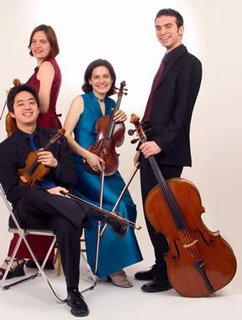In the interest of full disclosure, the author's undergraduate piano teacher is the mother of Nelson Lee, the first violinist of the quartet under review.

Jupiter Quartet (L to R: Nelson Lee, Meg Freivogel, Liz Freivogel, Daniel McDonough) |
Since the New England Conservatory-trained Jupiter Quartet burst onto the scene, by winning the Banff Competition in 2004, the group has become an Ionarts favorite. They were back in Washington on Friday night, for another concert on the Musical Evening Series at the Corcoran Gallery of Art. This program combined three autumnal masterpieces, all composed in the final years of their composers' lives. As a result, it was an evening of consummately crafted music, which nonetheless could have benefitted from at least a moment of levity.
Mendelssohn's final string quartet (F minor, op. 80) was a frenzied expression of the composer's grief at the death of his beloved sister. Its opening was a dramatic yowl, anxious tremolos over which the first violin's high-pitched keening was heard. The first movement never settled into a unified tempo, seemingly from a minor conflict between the driving impetus of cellist Dan McDonough and the other players. The second-movement Scherzo hit a sound, upbeat pace, the steady pulse reminiscent of Schubert's relentless Lied Der Erlkönig, contrasted with a somber, drone-centered trio. By the third movement, the Jupiter hit its stride, with a mournful melody passed around among exquisite solos from both violins and viola. The chromatic shudders pervading the fourth movement prepared the ground for the searing lament of Nelson Lee's first violin.
The second Britten quartet was the high point of the Jupiter Quartet's first concert at the Corcoran in 2005. (We also reviewed their 2005 concert at the Library of Congress but had to miss their debut at the Kennedy Center in 2007.) Here it was Britten's third quartet, one of his most austere and mournful works, the twin of his final opera, Death in Venice, a lament not for Aschenbach's decline but Britten's. The Jupiter's comfortable and well-considered way with Britten raises hopes that they will one day make a great recording of the composer's three quartets. This performance captured the sense of world-weariness, as well as the sounds of Britten's last visit to Venice, the lapping waves, the wailing gulls, the cosmic calm of the small canals, the trembling air of crystalline harmonic-topped chords. Bartókesque folk parlandi and meditative recitatives contrasted with the gently propelled passacaglia that concludes the quartet, during which especially the throaty but not barking viola of Liz Freivogel distinguished itself.
Senior violist Roger Tapping and cellist Natasha Brofsky joined their younger colleagues for Brahms's Sextet No. 2 in G major. A warm, gentle comity prevailed over this performance, capturing the interior anguish and joy. The Scherzo was set at a gently bubbling pace, allowing the interplay of duple and triple groupings. The Presto trio had a similar shpae but transformed into a barroom waltz spinning out of control from its raucous opening. The third movement was well contained and then allowed to blossom in a burst of color and sound over the pedal point in the cello, leading to a rollicking fourth movement of rousing, almost convulsive rhythms responding to the call of folk fiddle tuning.
The next concert on the Corcoran's Musical Evening Series will feature the Walden Chamber Players (April 25, 8 pm).






















































No comments:
Post a Comment